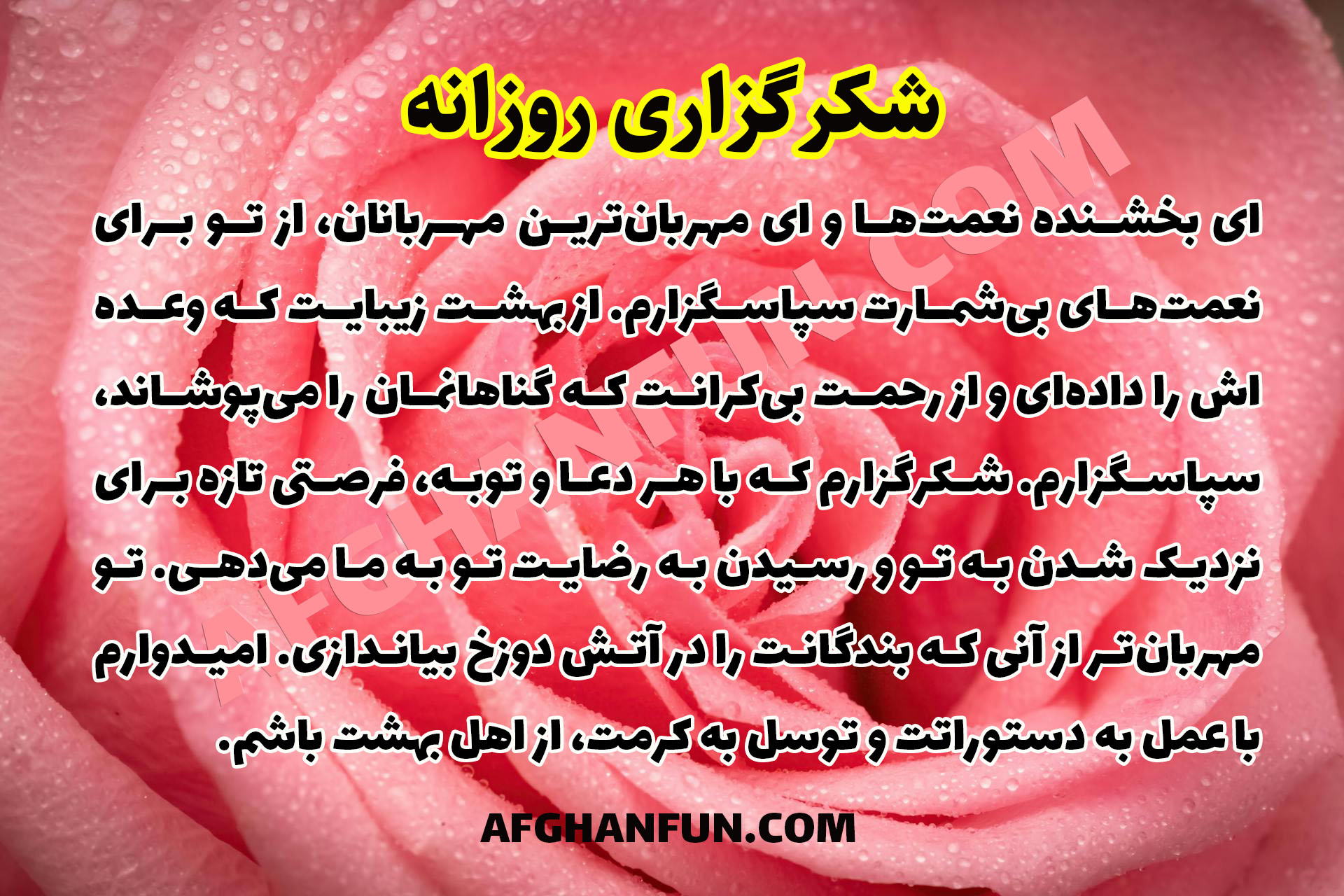
O Giver of blessings and Most Merciful of the merciful, I thank You for Your countless blessings. I thank You for the beautiful paradise You have promised and for Your infinite mercy that covers our sins. I am grateful that with every prayer and repentance, You give us a new opportunity to draw closer to You and attain Your pleasure. You are too merciful to cast Your servants into the fire of Hell. I hope that by acting upon Your commands and seeking Your grace, I may be among the people of Paradise.
ای بخشنده نعمتها و ای مهربانترین مهربانان، از تو برای نعمتهای بیشمارت سپاسگزارم. از بهشت زیبایت که وعدهاش را دادهای و از رحمت بیکرانت که گناهانمان را میپوشاند، سپاسگزارم. شکرگزارم که با هر دعا و توبه، فرصتی تازه برای نزدیک شدن به تو و رسیدن به رضایت تو به ما میدهی. تو مهربانتر از آنی که بندگانت را در آتش دوزخ بیاندازی. امیدوارم با عمل به دستوراتت و توسل به کرمت، از اهل بهشت باشم.
Эй бахшандаи неъматҳо ва эй меҳрубонтарин меҳрубонон, аз Ту барои неъматҳои бешумораттат сипосгузорам. Аз биҳишти зебоят ки ваъдаашро додаӣ ва аз раҳмати бекаронат ки гуноҳҳои моро мепӯшонад, сипосгузорам. Шукргузорам, ки бо ҳар дуо ва тавба, фурсате тазе барои наздик шудан ба Ту ва расидан ба ризои Ту ба мо медеҳӣ. Ту меҳрубонтар аз онӣ ки бандагонтат ро дар оташи дӯзах биандозӣ. Умедворам бо амал ба дастуротат ва тавассул ба карамтат, аз аҳли биҳишт бошам.
يا مانح النعم وأرحم الراحمين، أشكرك على نعمك التي لا تعد ولا تحصى. أشكرك على الجنة الجميلة التي وعدت بها وعلى رحمتك الواسعة التي تغطي ذنوبنا. أنا ممتن لك لأنك تمنحنا ب كل دعاء وتوبة فرصة جديدة للتقرب منك ولتحقيق رضاك. أنت أرحم من أن تلقي عبادك في نار جهنم. آمل أن أكون من أهل الجنة بالعمل بأوامرك والتوسل بكرمك.
This gratitude text is a heartfelt expression of reverence, humility, and hope directed toward God, emphasizing His mercy, blessings, and the opportunities for spiritual growth. The text is framed within the language of Islamic theology, invoking key concepts such as mercy, repentance, Paradise, and divine forgiveness. Here’s a breakdown of the key elements:
1. Acknowledgment of Divine Attributes:
- “O Giver of blessings and Most Merciful of the merciful”: The speaker starts by invoking God’s essential attributes, focusing on God’s generosity (“Giver of blessings”) and mercy (“Most Merciful of the merciful”). This reflects the Islamic understanding of God as both infinitely kind and the ultimate source of all blessings. The repetition of mercy emphasizes its centrality in God’s nature.
2. Gratitude for Divine Blessings:
- “I thank You for Your countless blessings”: The speaker expresses gratitude for the abundance of blessings that God has provided, acknowledging that God’s gifts are innumerable and beyond human comprehension.
- “I thank You for the beautiful paradise You have promised”: The speaker acknowledges the promise of Paradise, which in Islamic theology represents the ultimate reward for the faithful. This reflects hope in God’s promise and the desire to attain this eternal reward.
3. Recognition of Divine Mercy and Forgiveness:
- “for Your infinite mercy that covers our sins”: This phrase highlights the boundless mercy of God that can forgive all sins, emphasizing the concept of divine grace and the idea that human shortcomings are not barriers to God’s forgiveness. The text underscores the importance of God’s mercy in Islamic belief, where forgiveness is always available for those who sincerely repent.
4. The Role of Prayer and Repentance:
- “I am grateful that with every prayer and repentance, You give us a new opportunity to draw closer to You and attain Your pleasure”: The speaker expresses thankfulness for the constant opportunity for spiritual renewal through acts of worship (prayer) and repentance. This line emphasizes the idea that prayer and repentance are not just obligations but also means by which the believer can continually reconnect with God and improve their relationship with Him.
5. Hope in Divine Mercy:
- “You are too merciful to cast Your servants into the fire of Hell”: Here, the speaker expresses trust in God’s mercy and conveys the hope that God’s compassion will prevent believers from suffering eternal punishment. The reference to Hell is important, as it reflects the Islamic view of the afterlife, where individuals who are unrepentant or sinful face punishment. The speaker is relying on God’s mercy to avoid this fate.
6. Desire for Salvation:
- “I hope that by acting upon Your commands and seeking Your grace, I may be among the people of Paradise”: The speaker ends by expressing the hope of attaining salvation and Paradise through obedience to God’s commands and the seeking of His grace. It conveys both a sense of personal responsibility (acting upon God’s commands) and the reliance on God’s grace to achieve success in the Hereafter.
Theological and Emotional Underpinnings:
- Gratitude: The text is a prayer of thanks for God’s mercy, blessings, and the opportunities for spiritual renewal. There is a deep sense of humility and recognition of the unearned nature of these blessings.
- Hope and Trust: The speaker places trust in God’s mercy to forgive and guide, while expressing a desire to attain God’s favor and be saved from punishment. There is a balance between personal responsibility (acting upon God’s commands) and reliance on God’s mercy (seeking grace).
- Spiritual Growth: There is an emphasis on the continual opportunity for growth through repentance and prayer, reinforcing the Islamic idea that the believer’s journey is one of constant striving toward closeness to God.
Linguistic and Stylistic Features:
- The language is formal and respectful, using titles like “O Giver of blessings” and “Most Merciful of the merciful” to honor God.
- The tone is one of humility and supplication, acknowledging the greatness of God and the smallness of the individual.
- The use of parallelism (e.g., “I thank You for…,” “I am grateful that…,” “I hope that…”) creates a rhythmic flow, reinforcing the sincerity and depth of the speaker’s gratitude and hope.
Conclusion:
This gratitude text is a prayer that beautifully conveys a believer’s deep thankfulness for God’s mercy, blessings, and promises, as well as their hope in divine grace for salvation. It reflects key Islamic concepts of God’s mercy, repentance, the importance of prayer, and the ultimate goal of attaining Paradise. The speaker’s humility, trust, and spiritual longing create an emotionally resonant and theologically rich message.











